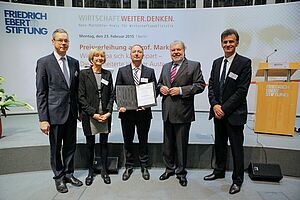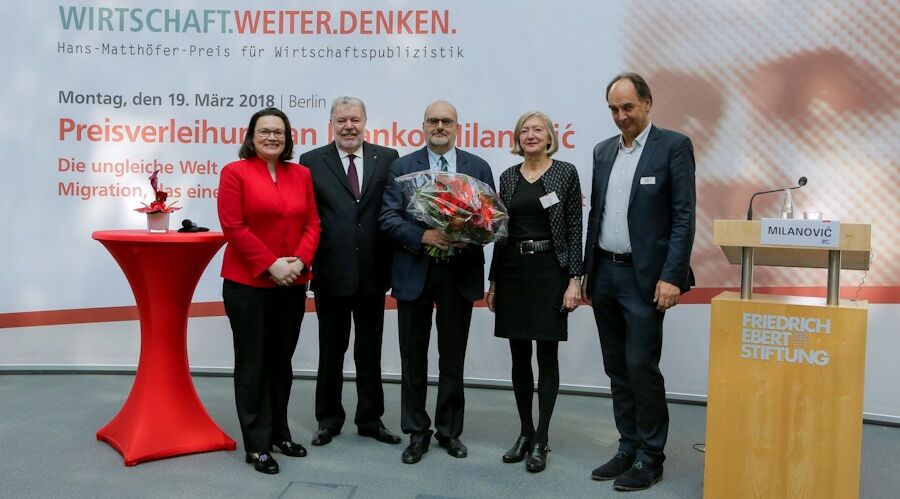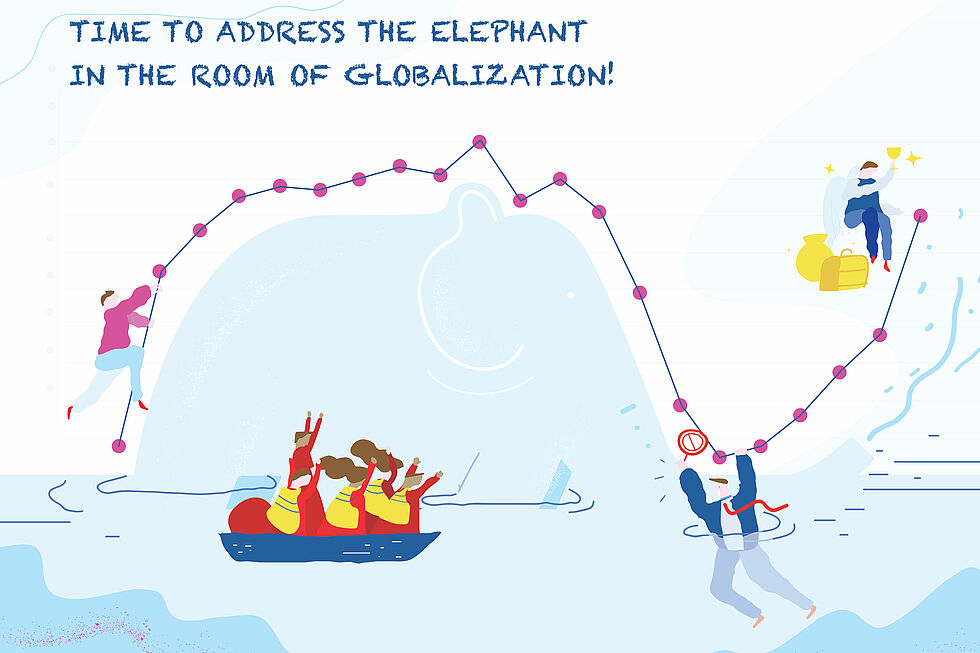Book award honours economist attempting new answers to rising inequality
"As in every year, the jury had to make a tough decision" confesses Dr Andrä Gärber, who has the hard task to shortlist possible laureates for the Hans Matthöfer Prize, an annual award that builds on the legacy of the namesake social democratic politician and trade unionist.
In this interview with Gärber, head of the division of economic and social policy in the Friedrich-Ebert-Stiftung and General Secretary of the Hans-und-Traute-Matthöfer-Stiftung (administered by the Friedrich-Ebert-Stiftung), we talked about the history of the award, its importance in times of rising inequality, and this year’s laureate.
The Hans Matthöfer Prize this year was awarded to the economist Branko Milanovic for his book Global Inequality: A new approach for the age of globalization. What distinguished Milanovic’s work among the other five contestants for the prize?
First of all, please let me say that, as in every year, the jury had to make a tough decision, as all the entries were of outstanding quality. Branko Milanovic's book explains why on the one side globalization has reduced inequality between industrialised and emerging countries, but on the other it has led to rising inequality in the majority of developing countries, leading to mass migration. The former World Bank economist has thereby laid the fundamentals, which allows for the creation of specific instruments aimed at combating inequality.
What aspects of Milanovic’s analysis in the study of inequality are particularly relevant, in your view, to the realities social democracy is confronted with and is trying to address in Germany and internationally?
Milanovic impressively shows that the highest income groups have disproportionately benefited from economic growth in the last decades. In contrast, middle and lower income groups have hardly made any income gains. These developments pose not only threats to economic stability. Staggering income inequality results in migration from the poorer regions of the globe to the rich countries in the North. Hence, migration fuelled by poverty and inequality are currently seized upon by right-wing populist movements, which essentially threaten our democracies. This fact should be born in mind by social democrats, when confronting right-wing populism and combating poverty at home and abroad.
For those who are not familiar, what is the Hans Matthöfer Prize about? And what are the criteria for selection?
The "Hans-Matthöfer-Preis für Wirtschaftspublizistik", which translates as the Hans Matthöfer prize for publications in the field of economics, honours economists and social scientists attempting new answers to the big economic and social policy challenges of our time, beyond standard economic theory or the macroeconomic mainstream.
"Only greater theoretical diversity, a pluralism of methods and an interdisciplinary approach can guarantee scientific competition over the best economic ideas, models and political recommendations on a sustainable organisation of the economy and society."
You see, during the last 30 years mainstream economic thinking in Germany has been dominated by conservative neo and ordoliberal thinking. This mindset has permeated German politics, the media and public debate. The Hans-Matthöfer Prize aims to help create a level playing field between the different schools of thought by supporting writers who argue in favour of alternative and progressive theories and solutions. We believe that only greater theoretical diversity, a pluralism of methods and an interdisciplinary approach can guarantee scientific competition over the best economic ideas, models and political recommendations on a sustainable organisation of the economy and society. The shortlisted works for the 10,000-euro prize have to meet these criteria.
When was the award first established? Who constitutes the jury?
In the wake of the European debt crisis, Mark Blyth for the German translation of his book "Austerity: The History of a Dangerous Idea" was the first laureate in 2015. Mariana Mazzucato received the award in 2016 for the German translation of her book "The Entrepreneurial State" on the role of the state in fostering innovation, growth and employment. In 2017, Oliver Nachtwey was awarded the prize for his book "Die Abstiegsgesellschaft – Über das Aufbegehren in der regressiven Moderne" (soon to be published in English as "Germany's Hidden Crisis – Social Decline in the Heart of Europe"), which analysed the reasons for and the effects of declining upward social mobility in Germany.
The current members of the jury are: Prof Dr Peter Bofinger of the University of Würzburg and Member of Germany’s Council of Economic Experts For Overall Economic Development, Thomas Fricke, Chief Economist of the Internet portal "NeueWirtschaftsWunder" and Chief Economist of the European Climate Foundation, as well as Dr Brigitte Preissl, Editor-in-Chief for the professional journals "Wirtschaftsdienst" (link in German) and "Intereconomics" (link in German).
What is your role in the selection process?
As General Secretary of the Hans-und-Traute-Matthöfer-Stiftung my role is to draw up a shortlist of candidates. We usually receive around 70 entries (books, newspaper articles, blogs, academic journal articles as well as book chapters and anthologies). All entries are examined in depth, in order to see if they meet the criteria of the award. The independent jury has the last word.
The award bears the name of Hans Matthoefer, a German social democrat and former minister of economy. An obituary from 2009 describes him as the politician who confronted the 1970s economic crisis. What of his legacy is upkept through the award?
Hans Matthöfer (1925–2009) was a popular SPD politician and trade unionist, who served as an influential minister for the portfolios of research, economics and finance in several federal governments between 1974 and 1982. He is credited with the inclusive modernization of the German economy and innovation system. After leaving public office, he founded the Hans-und-Traute-Matthöfer-Stiftung, administered by the Friedrich-Ebert-Stiftung, with the aim of promoting historic and contemporary research on the fundamental problems for business, the economy and society. A special focus lies on technological development and its impact on humanizing the world of work, and on society as a whole.
###
For more information on the award visit the official page (link in German).
About FES Connect
Connecting people, in the spirit of social democracy, we source and share content in English from the German and international network of the Friedrich-Ebert-Stiftung.







